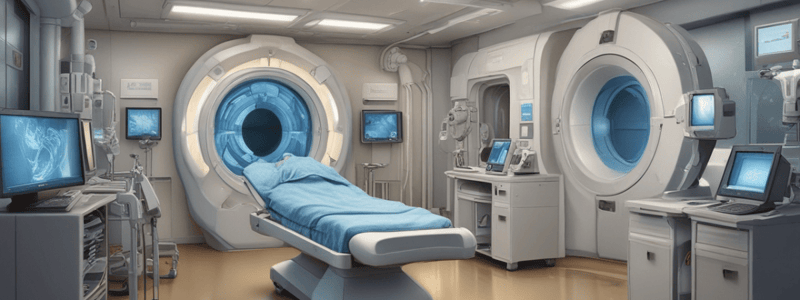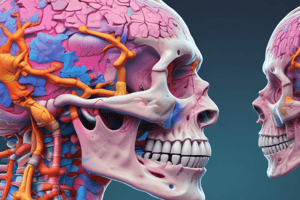Podcast
Questions and Answers
Motion artifact is a machine-based artifact that occurs with voluntary or involuntary patient movement during image acquisition.
Motion artifact is a machine-based artifact that occurs with voluntary or involuntary patient movement during image acquisition.
False (B)
Transient interruption of contrast is a common flow artifact seen in MR angiography studies.
Transient interruption of contrast is a common flow artifact seen in MR angiography studies.
False (B)
Clothing artifacts are usually not recognized during imaging examinations.
Clothing artifacts are usually not recognized during imaging examinations.
False (B)
Beam hardening is the phenomenon that occurs when an x-ray beam comprised of monochromatic energies passes through an object.
Beam hardening is the phenomenon that occurs when an x-ray beam comprised of monochromatic energies passes through an object.
Photon starvation is a source of ring artifacts that may occur in CT.
Photon starvation is a source of ring artifacts that may occur in CT.
Beam hardening results in selective attenuation of higher energy photons.
Beam hardening results in selective attenuation of higher energy photons.
Transient interruption of contrast is caused by an increase in the flow of opacified blood from the inferior vena cava to the right side of the heart.
Transient interruption of contrast is caused by an increase in the flow of opacified blood from the inferior vena cava to the right side of the heart.
Clothing artifacts are often ignored by radiographers and radiologists.
Clothing artifacts are often ignored by radiographers and radiologists.
Beam hardening decreases the mean beam energy.
Beam hardening decreases the mean beam energy.
Photon starvation occurs in low attenuation areas, particularly in front of metal implants.
Photon starvation occurs in low attenuation areas, particularly in front of metal implants.
Study Notes
Artifacts in Medical Imaging
- Motion artifact occurs due to voluntary or involuntary patient movement during image acquisition.
Flow Artifacts
- Transient interruption of contrast (TIC) is a common flow artifact seen in CT pulmonary angiography (CTPA) studies.
- TIC is caused by an increase in the flow of unopacified blood from the inferior vena cava (IVC) to the right side of the heart, often during deep inspiration.
- This results in suboptimal contrast opacification of the pulmonary arteries.
Clothing Artifacts
- Clothing artifacts, similar to jewelry artifacts, are common on imaging examinations, especially plain radiographs.
- Radiographers and radiologists recognize clothing artifacts and take steps to minimize their impact:
- Retaking the image after the patient removes the offending garment.
- Labeling the image with a warning to avoid misinterpretation.
Beam Hardening
- Beam hardening occurs when a polychromatic x-ray beam passes through an object, resulting in selective attenuation of lower energy photons.
- The effect is similar to a high-pass filter, where only higher energy photons contribute to the beam, increasing the mean beam energy ("hardening" the beam).
Photon Starvation
- Photon starvation is a source of streak artifacts in CT.
- It occurs in high attenuation areas, particularly behind metal implants.
Studying That Suits You
Use AI to generate personalized quizzes and flashcards to suit your learning preferences.
Description
Test your knowledge of common artifacts that can occur during CT scans, including motion artifacts, transient interruption of contrast, and clothing artifacts. Learn how to identify and overcome these issues to obtain high-quality images.




